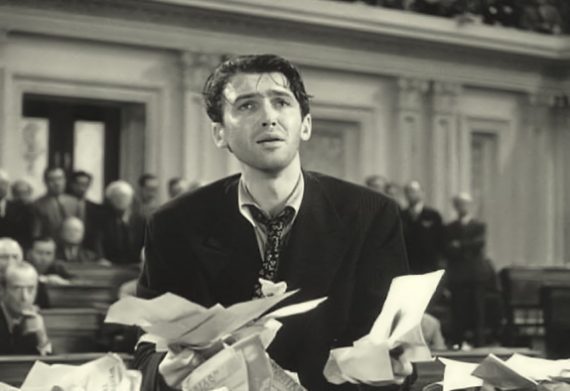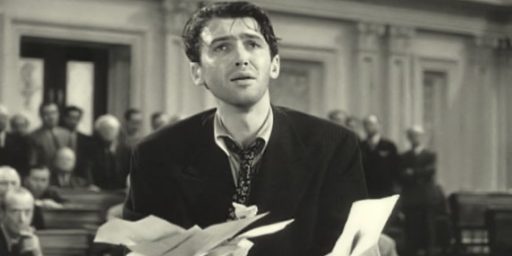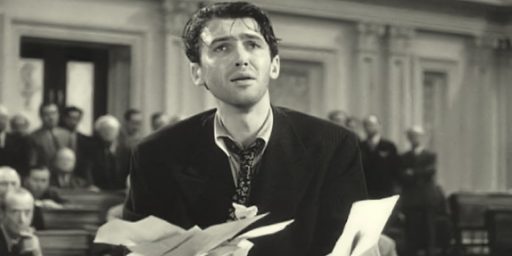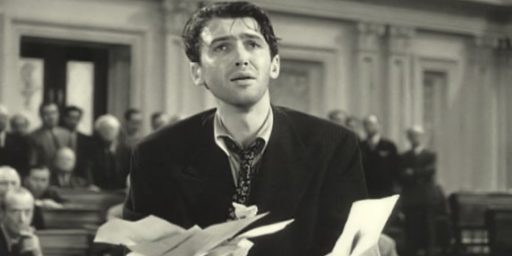Filibuster Reform Appears To Be Dead
Once again, it looks like efforts to reform the Senate's filibuster rules have fallen victim to that old devil politics.
While nobody was paying attention, it looks like the effort to reform the filibuster in the Senate has died a quiet death:
To the dismay of a younger crop of Democrats and some outside liberal activists, there is no chance that rules surrounding the filibuster will be challenged, senior aides on both sides of the aisle say, because party leaders want to protect the right of the Senate’s minority party to sometimes force a supermajority of 60 votes to approve legislation.
Instead, rank-and-file lawmakers will receive pitches from Sens. Charles E. Schumer (D-N.Y.) and Lamar Alexander (R-Tenn.), who have been negotiating more limited changes, such as with “secret holds” that allow an anonymous senator to slow legislation. In addition, some modifications could be made to the way confirmations are handled for agency nominees who do not have direct roles in policymaking.
The main reason that the effort seems to have failed is, not surprisingly, that both sides of the aisle and some activists understand that the current filibuster rules are very useful when they happen to be in the minority:
With the 47 Republicans united in opposing any changes to filibuster rules, Udall, Merkley and Sen. Tom Harkin (D-Iowa), their most senior supporter, remained far short of the votes needed to nullify the rule known formally as “cloture,” requiring 60 senators to vote yes to end debate so a final vote can be held. Many senior Democrats, who have watched the majority flip back and forth a half-dozen times in the past 20 years, balked at taking away minority rights, out of fear that Democrats could soon find themselves in the minority.
Moreover, while liberal groups such as MoveOn.org and some unions such as the Communications Workers of America are supporting the Udall effort, the liberal coalition is far from united on the issue. Some large members of the AFL-CIO have been noticeably silent, while some abortion rights groups have publicly declared their opposition to changing filibuster rules. That, some Democratic aides said, is because in the 1990s and in the early days of the George W. Bush White House – when Republicans controlled both ends of the Capitol – these groups relied on their Senate Democratic allies and the 60-vote threshold to protect key rights such as Davis-Bacon wages for federal works projects and the Roe v. Wade abortion decision.
As I said this is no real surprise, although it is a little disappointing since, as I noted last month, the filibuster reforms that Udall and Merkley were advocating wasn’t all that radical:
This proposal isn’t the elimination of the filibuster that pundits like Ezra Klein and Matthew Yglesias have been advocating for the better part of it year, so it doesn’t totally dilute the rights of the Senate minority to have their voice heard in debate. Instead, these reforms propose doing things like making Senators who want to block debate on a bill stand up and do so publicly, whether by holding the floor via a filibuster, or by eliminating the secret hold. None of these detracts from the rights, or powers, of the minority to have their voices heard, but it does mandate transparency, and to the extent that transparency means that Senators will be less likely to block legislation just for the hell of it, or just to appease their base. It would also seem to encourage more actual debate, which strikes me as a good thing.
Udall says that he intends to push for a vote on the reform package but, without the backing of the leadership and his fellow Senators, it’s unlikely to get anywhere. Which means that the current system, which has only existed since 1975, is here to stay for awhile longer.







I can understand why neither party wants to give up the right to force a super majority. What I don’t understand is why they don’t change the rule to force actual filibustering – if you don’t feel strongly enough about an issue to stand up and filibuster, then you’re just being obstructionist.
Besides, it could be entertaining.
You would prefer mob rule demokracy perhaps??
When ,not if the GOP takes over the senate and tries to repeal obammercare, those who now decry the filibuster, will be the first ones to defend it.
Ye olde leftist hypocrisy..
There will come a time in the very near future, Dougie, when your little leftist heart will be over joyed filibuster reform (?) failed.
Without the filibuster, we would have lame duck type cramdowns 24/7.
That black flag is a nice touch.
A little off topic, Rasmussen has Obama’s aprroval rating at 52% today, the highest its been since July of 2009:
http://www.rasmussenreports.com/public_content/politics/obama_administration/obama_approval_index_history
How can I be this cynical and still manage to be disappointed? Why can’t I kill this last, tiny glimmer of hope?
The great irony here is that the continued existence of the filibuster will completely doom any chance the Republicans may have now, or in the future, from undoing Obamacare, in part, much less in whole.
Tano, I don’t think that’s an accident.